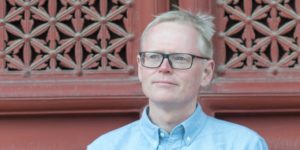 Mark Obama Ndesandjo
Mark Obama NdesandjoDuring a recent discussion with some children, I suggested a game. I proposed giving each of the 26 letters in the English alphabet a number: A is 1, B is 2, C is 3 and so forth. “Find me a word whose letters add up to 100,” I asked. “It has to do with dreams and success.”
While the children were thinking, I reflected on the power of dreams. Dreams are about the future and our individual potential to carve our own path. It was a dream that brought me to China eight years ago, a dream that I would start a new life, based on learning the language and making a difference.
The city I chose to live in was
Shenzhen. To many it is a boom town, sprawling, uncultured and ugly. To me, it is young, dynamic, conveniently situated next to Hong Kong, and full of people from all over China — all seeking their dreams.
Although “Shenzhen speed,” like “time is money,” are catchphrases that help characterize this 30-year old city, I prefer to think of another Shenzhen, a place that is part of the future of China but also has its feet rooted in tradition.
The traditional Shenzhen is still here: All you have to do is look behind the glimmering new skyscrapers and fancy shopping malls. At the gas station on Lian Hua Road, next to the near-bankrupt massage parlor whose gray, neon-lit walls always seem on the verge of collapsing, and where the new subway station has turned the area topsy turvy, one discovers Jing-tian Road almost by accident.
At once there is a hush in the air, as though the street is singing a silent benediction. Tall, leafy mangroves line both sides of the road.
Walking up the gentle incline, I see families playing badminton in a small park to the right. On the left, I spot a woman sitting in her idling, brand new, white Honda, leaning out her window as she chats with a friend, but her mind really focused on showing off her beautiful car. On the right, I see the
liu da , or slow walk, of grandparents as they meander behind their grandchildren. As I cross the intersection, branches from the trees dip down precariously so that the leaves feel like they may touch my head.
About five years ago, after a busy workday I returned to a street that just that morning had been lined with 30-year old cypress trees. Now, barely 8 hours later, it was a naked patch of concrete, punctured in regular intervals by large gaping holes where the trees had been torn out. I complained to a Chinese friend, who replied, “Don’t worry, it’s just development. It’s good for Shenzhen.”
I wonder: Does Jing-tian Road face that future? I hope not.
I believe that in the future China, the current Shenzhen disposition will become more relaxed, more traditional. “Time is money” will become “time is precious but can be shared with strangers.” Or, in the words of Confucius,
Don’t just treasure the water, treasure the mountain; don’t just move, but be still, don’t just enjoy, but preserve.
So perhaps by the time the kids of today’s Shenzhen grow up there will be a change in the current attitude toward headlong growth. Perhaps they will begin to ponder questions like: Do they have a wholesome life based on values such as establishing a quality-based economy and social responsibility, and not living just to pursue a quick yuan? Will they begin to stop to check out the blue skies, safely drink water direct from the tap, have more time to be with loved ones, volunteer, and walk where tree leaves gently touch?
The scene on Jing-tian Road mingles the ancient Chinese respect for the environment with a dancing, almost ebullient, sense of repose. It is rooted in the past, experienced today, and, I believe, will be part of that future, wholesome, life.
A pursuit of a dream brought me and millions of others here to Shenzhen. As we Shenzhenites continue to barrel into the future, we will remember our dreams, but also keep an eye on tradition.
As for the word that adds up to 100, take a guess.
Mark Obama Ndesandjo is the author of the novel “Nairobi to Shenzhen.” This article was adapted from his upcoming memoir. Earlier published in the New York Times; here republished with the kind permission of the author.)



















